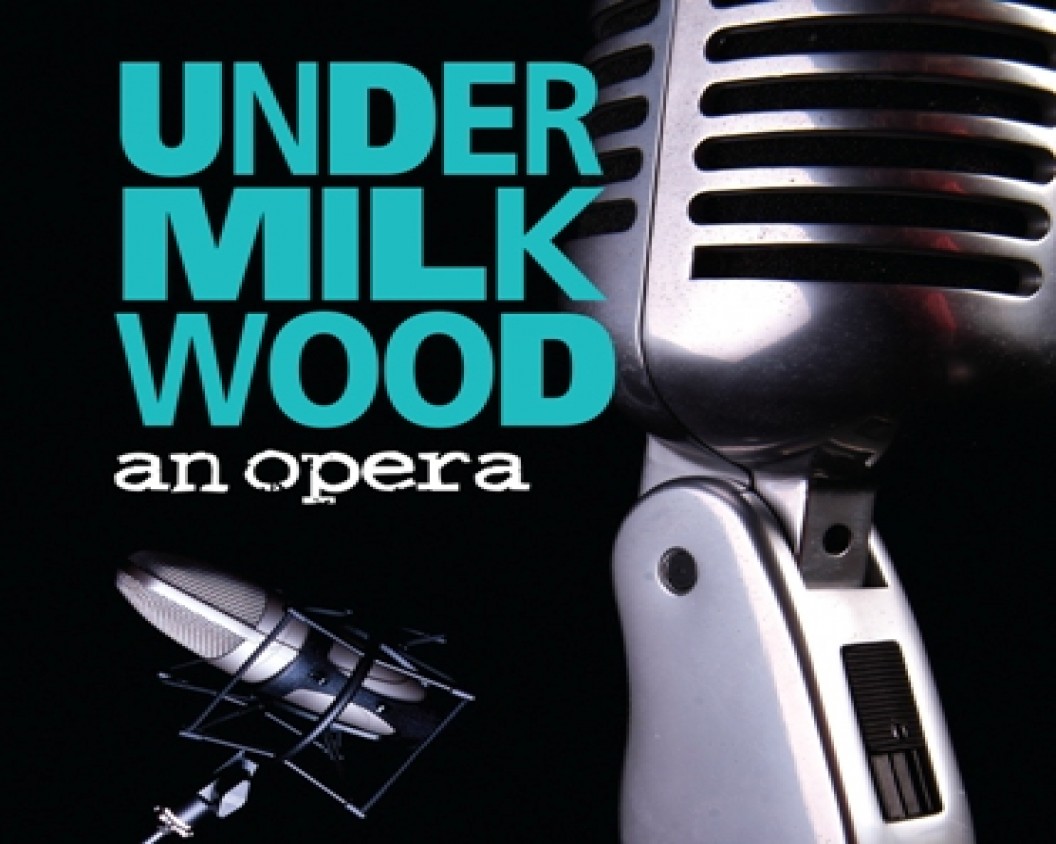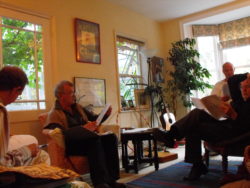Programme Note
Summary
In 1954 Dylan Thomas caused a literary storm with his play for voices, Under Milk Wood. Sixty years on John Metcalf created a ground-breaking new opera recreating Thomas’s world of Llaregubb – the town that went mad. Under Milk Wood: an opera – shortlisted for the 2015 International Opera Awards – is John’s seventh opera. He began composing it in 2007 and the first workshops for the piece were held in 2008.
Under Milk Wood: an opera weaves together extraordinary poetic and comic language, contemporary and ancient instrumental music, recorded and live sound. Its complex and detailed sound world is realised by a 13 -strong company of singers and multi-instrumentalists.
Taliesin Arts Centre (Wales) was the lead partner in the world premiere production. Le Chien Qui Chante (Quebec) & Companion Star (New York) were co-producers and the production was developed in association with Welsh National Opera. The world premiere took place at the Taliesin Arts Centre in Swansea on 3 April 2014. The production was directed by Keith Turnbull, and the musical director was Wyn Davies, who also played the piano and synthesiser and sang the role of Organ Morgan.
There is a comprehensive wikipedia entry about Under Milk Wood: an opera.
Performance History
World premiere performances
3rd-5th April 2014 Taliesin Arts Centre, Swansea
Then on tour around Wales (8-15 April)
8th April Aberystwyth Arts Centre, Aberystwyth
11th-12th April Sherman Theatre, Cardiff
15th April Galeri Caernarfon, Caernarfon
Reviews
” downright audacious with beguiling skill and care . . . Metcalf’s affection for Thomas’ bucolic world captivated the packed audience” The Independent
“an intense, exhilarating and deeply rewarding performance . . . WHISPER it, but John Metcalf’ might have achieved the seemingly impossible. He has taken Dylan Thomas’ untouchable play for voices, and by setting it to a soundtrack of such expressive beauty, might – just might – have made it better” The South Wales Evening Post
” Keith Turnbull’s staging is deft and minimally decorated – a rocking chair, a tin bath, foley tables arranged with pitchers of water, a teapoy, a coffee grinder, coconut halves . . . Michael Douglas Jones’ Captain Cat is the huge heart at the centre of this local yet universal fantasy” The Times
” spellbinding, tender, funny – superb singing, acting, playing – see it!” BBC World of Music
Complete reviews :
Written for radio, Dylan Thomas’s celebrated play risks losing its charm in translation on to the stage – but here it remains triumphant. . .
Adapted to other media, Dylan Thomas’s play for voices – thought to be the finest written for radio – risks constituting a poisoned chalice of the kind Thomas’s schoolmaster Mr Pugh would have been happy to lift from his copy of Lives of the Great Poisoners and hand to his detested wife. But for this year’s Thomas centenary, composer John Metcalf has skilfully telescoped narration and dialogue, bringing Michael Douglas Jones’s blind Captain Cat centre stage; the best-loved lines are all there, iconic characters retain their charm.
What comes through is a deep affection for the populace of Under Milk Wood and an understanding of their quirkiness, bitchiness, humanity and, crucially, their black humour. Metcalf’s prime virtue is to have respected the words, to have a real feel for their rhythms, for the sharp social observations they carry and, above all, for their intrinsic musicality. His melodic lines have a natural flow and Thomas’s lyricism is treated with kid gloves.
Keith Turnbull’s imaginative co-production marries Canadian and Welsh forces, with just eight singers and five on stage musicians, conducted by Wyn Davies. While, clearly, this can’t be an opera in the usual sense – nothing hugely dramatic happens – Llareggub’s everyday flurry of events, from dawn to the fall of night, gathers pace and subsides again. Structurally, Metcalf’s solution is to move full circle through the cycle of keys, returning to life-affirming C major. Action is streamlined by being set in a recording studio with all the paraphernalia of foley effects, every voice pressed into action to create the soundscape. Sometimes this can seem cluttered and over-fussy, as does the lava-lamp style lighting of the opening scene. Nevertheless, any misgivings are countered by the stylish singing, with baritone Paul Carey Jones and soprano Elizabeth Donovan’s sympathetic characterisations standing out.
The Guardian April 2014 Rian Evans
John Metcalf’s new operatic version of Under Milk Wood is a testimony for Dylan Thomas, says John Allison
Few descriptions of Dylan Thomas’s radio play Under Milk Wood get far before musical comparisons are invoked, and such tags as “a fugue for voices” and “an uproarious and singing lament” reflect well the workings of this poetic masterpiece.Though these are words in no need of further musicking, the orchestration of voices and sounds through which Thomas evokes the dreams and waking hours of a Welsh seaside village simultaneously call out for a setting in music, so it is surprising that John Metcalf’s new operatic version is breaking ground; only a 2006 adaptation by the Austrian composer Akos Banlaky, Unter dem Milchwald, seems to have preceded it.
Commissioned by the Taliesin Arts Centre in Swansea, leading a Welsh-North American consortium, the new opera forms a major part of the centenary celebrations for the city’s most famous poetic son. The Swansea-born Metcalf, with six previous operas to his credit, has composed music that captures the ripeness of Thomas’s vision and never works against the poetry, but if his 110-minute score has a fault, it is that is all a little too, indeed, dreamy. Though rigorously structured over the 12 chromatic steps to mirror the passing of 24 hours, and rooted on C at its opening and close, the 29 short scenes flow without much contrast.
Heavily pruned out of operatic necessity, the text does “begin at the beginning” and this version turns Captain Cat (sung by Michael Douglas Jones in an aptly unvarnished bass-baritone) into the sole narrator. Keith Turnbull’s wonderfully fluid production fixes him in a centre-stage rocking chair, but everyone else moves around, the small ensemble of musicians promenading at times to mix with the cast. Also manipulating some of the sound effects that Metcalf has integrated into his onomatopoeic score, the singers deliver most of their lines in a tonal parlando, breaking occasionally into fuller aria-like numbers.
A uniquely integrated opera, this uses contemporary clothes to timeless effect and makes atmospheric use of dark and abstract projections – though one scene uses Thomas’s own sketch for his imaginary Llareggub. The five-member band is directed from the piano by Wyn Davies (doubling as the character of Organ Morgan) and employs a flautist, percussionist, violinist and harpist, the last two also playing folk instruments, the Crwth and Lever Harp. In multiple roles as the flawed villagers, the singers Elizabeth Donovan, Helen-Jane Howells, Gweneth-Ann Jeffers, Paul Carey Jones, Karina Lucas, Richard Morris and Eamonn Mulhall are all excellent in getting the words across and capture a world of delight and regret, gossip and black humour.
At last, then, an operatic testimony for Thomas, who tantalisingly at the time of his death was planning an opera with Stravinsky (instead, the composer wrote In Memoriam Dylan Thomas, setting “Do not go gentle into that good night” as its central section). Metcalf’s strikingly unusual opera has something in common perhaps with Ned Rorem’s Our Town, a reminder of how that Thornton Wilder play must have influenced Thomas. Both plays – and operas – are local yet universal: those with the deepest knowledge of Thomas’s masterpiece will get the most out of this new work, yet everyone should fall under its strange spell.
The Telegraph April 2014 John Allison

